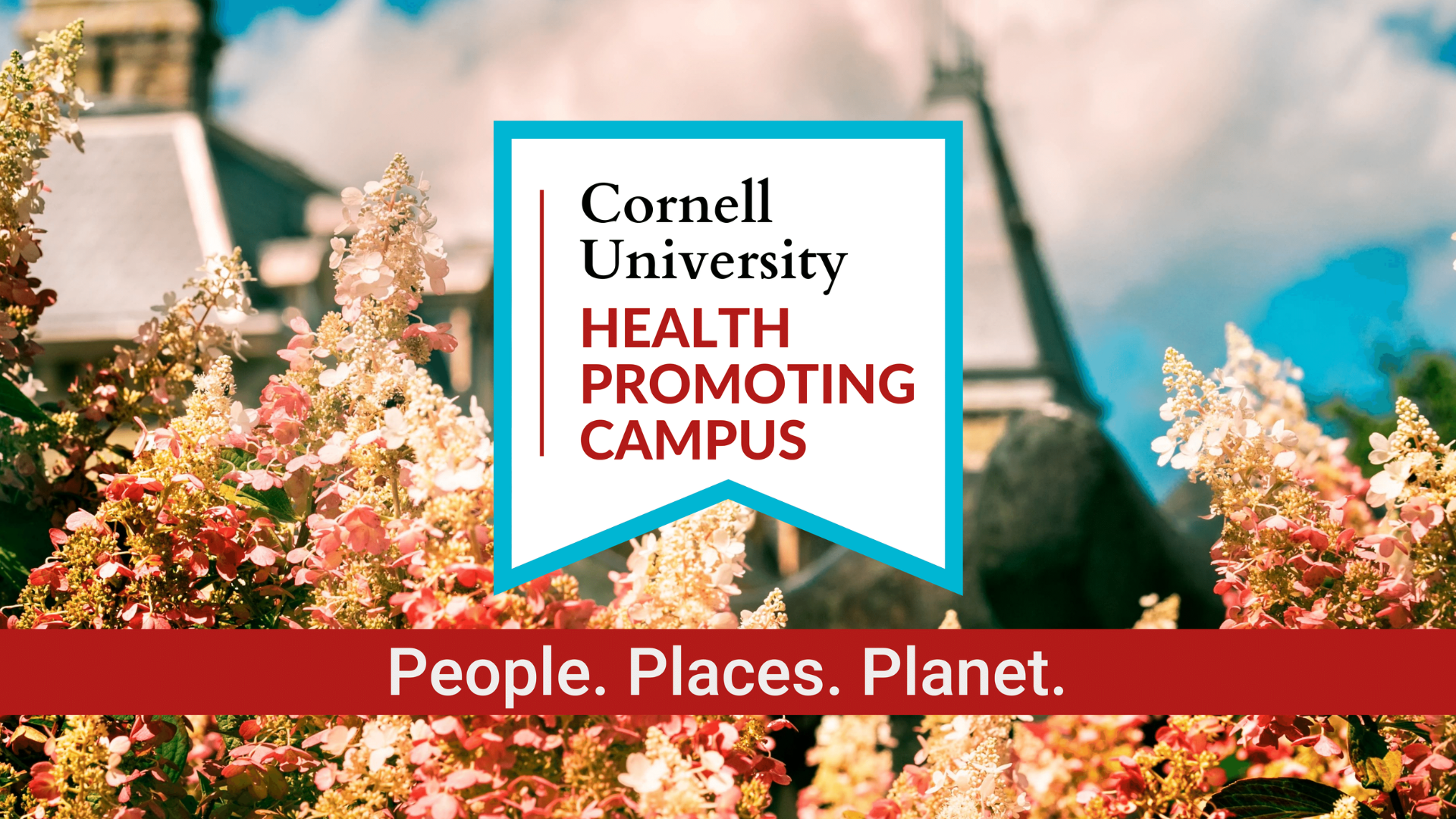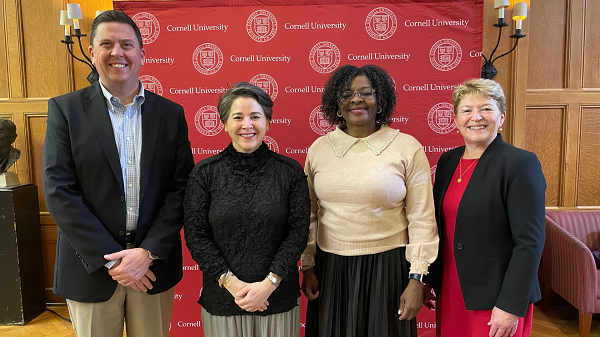New chapter begins for health and well-being at Cornell
As a health-promoting campus, Cornell’s commitment to “People, Places, and Planet” supports the holistic well-being of students, staff, and faculty.
Adoption, collective momentum
In October, Cornell leadership signed the Okanagan Charter and made a formal pledge to promote holistic health and well-being across campus. The Charter provides a set of guiding principles for operationalizing this commitment across all facets of living, working, and learning at Cornell.
“These principles will help provide structure for the next phase of Cornell’s Student Mental Health Review, a collaborative process that has paved the way for a shared commitment to the betterment of mental health inside and outside of the classroom,” said Ryan Lombardi, vice president for student and campus life.
More than 100 U.S. colleges and universities are currently exploring adoption of the charter; Cornell is one of nearly a dozen who adopted it this fall – and was the first Ivy League institution to do so. Formal charter adoption signals institutional willingness to embed health into all aspects of campus culture, including, administration, campus operations, academics, and student life outside of the classroom.
For Cornell, this commitment advances in a systemic, sustainable way both the spirit of the student Mental Health Review and priorities for faculty and staff well-being.
Christine Lovely, vice president and chief human resources officer said, “Our understanding of the health and well-being needs of our workforce have grown, partly due to the pandemic and world and national events. This commitment acknowledges the interconnectedness of the university community and I’m proud to be among a leadership team that recognizes this.”
Impacts on student well-being
Tangible next steps in student life include, among others, expanding intentional opportunities to foster connections between undergraduate, graduate, and professional students as they transition to Cornell, embedding positive psychology interventions to increase students’ well-being and flourishing, and identifying strengths-based approaches to embed into existing campus environments, such as residential life, orientation, and advising.
To assist students in navigating Cornell’s rigorous academic environment, Cornell’s colleges are implementing, or in the consideration phase, of a limit in the number of credits allowed for the first semester, first-year students to prioritize their well-being and focus on building strong social connections in their transition to student life. Additionally, students will see changes to allowed graded work over break to help them truly rest. In-depth conversations about other potential changes to academic policies and practices are also well underway.
“Graduate and professional students will benefit from this more holistic approach, one that acknowledges the full aspects of an individual,” said Kathryn J. Boor, dean and vice provost for Graduate Education. “An approach that will support them in achieving their full potential in teaching, in learning, in research, and in engagement – all of the many facets of the Cornell experience.”
Impacts on faculty and staff well-being
Becoming a Health-Promoting Campus aligns with the employee well-being model, created at Cornell in 2018 to visualize the interconnectedness of the myriad components of well-being, and continues to aid in communicating employee-specific programs and services. Additionally, well-being liaisons in each college and unit continue to increase information reach.
Regular employee experience surveys have become a powerful tool in recent years as well, helping clarify gaps and trends, and drive university support, practices, and policies. An advocate for employee health and well-being, Lovely states, “I am committed to addressing gaps and barriers where they exist for our faculty and staff so all employees feel like they belong at Cornell and can thrive.”
Further, understanding the experiences of managers, and supporting them in leadership roles, has become exceedingly important in recent years, from pandemic response and workforce fluctuations, to evolving job demands and responding to increased stress and pressure faced by their employees personally and professionally. Cornell continues to expand tools and development opportunities, but also encourages managers to invest in themselves and to remain flexible.
Building on foundations, enhancing structures
According to Julie Edwards, director of Cornell Health’s Skorton Center for Health Initiatives, the Student Well-Being Council,
a diverse group of representatives, including undergraduates, graduate students, executive sponsors, and university leadership, will be advising much of this work moving forward. “The Student Well-Being Council has been created to serve as the advisory group to oversee next steps in becoming a health-promoting campus and sustain this work going forward,” she said.
For Lisa Nishii, vice provost for undergraduate education, making significant systemic changes requires continued discussion and evaluation.
“In order for us to know whether we are truly making a difference, it’s critical for us to evaluate the impacts of the changes that we adopt,” Nishii said. “To this end, we’ve established a research and evaluation team as a part of the Student Well-being Council that will apply a multi-method approach to monitoring our progress over time so we can identify which changes are working and which ones may need to be revised… so that we can do even better.”
A Workforce Well-being Core Advisory Group, sponsored by Lovely, will focus on faculty and staff well-being. It is comprised of health and well-being leaders and practitioners, constituent representatives, and executive sponsors. The group will initially review available employee experience data and the inclusivity and accessibility of well-being related practices, programs, and services.
These overarching student and employee advisory groups will identify evidence-informed strategies to support holistic health and well-being across campus. While there is significant work already happening, the Okanagan Charter adoption positions Cornell for future success.
“We have a strong foundation through Cornell’s mental health framework, the student Mental Health Review, existing employee well-being initiatives, and campus sustainability efforts,” Edwards said. “We’re thinking critically about how we can improve existing systems so students, faculty, and staff know how to navigate campus resources to access services for themselves and others.”
Some of the larger systemic changes will take some time, but many impactful changes are already being put into place. For example, the Office of the Dean of Students is developing and delivering essential basic needs workshops to students, there are growing opportunities for first-generation students to connect and learn more about important resources, as well as the reimagination of critical services leading to the creation of new office providing Student Support and Advocacy Services.
Get help, get involved
To support holistic well-being, all members of the Cornell community are invited to engage in this work as we enhance, expand, and create strengths-based strategies, services, and systems moving forward. If you are interested in learning more about this process or about ways you may participate, email directly at mhrc@cornell.edu.
For services and resources that support mental health and well-being for the Cornell community, visit mentalhealth.cornell.edu for more information.


